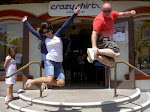This book has some great ideas that I could easily see myself implementing in the classroom. It has still been a challenge for me to identify ways to differentiate lessons. I understand the concept and the importance of it, I think I just need additional practice in differentiating lessons and it will become easier for me over time.
One activity I liked in the book was the conversational round table. I thought it was a great extension activity for literature we are currently reading in our classroom. This activity would be an easy one to differentiate in a couple of different ways. The first way I would differentiate it is to give different groups of students more or less areas to expand upon depending on their abilities. I also could differentiate that activity by giving students different levels of thinking or expanding. One group could analyze the characters, one could analyze the themes, and another could analyze the different aspects of the voice of the writer.
I also liked the evaluation checklist on 'when you work with peers.' This would be a great checklist especially for older students to determine their feelings about working with groups. I think this is a great resource for me as a teacher to gather information about my students in order to make differentiating lessons. I would also be able to change up the different kinds of group activities I can do in my classroom that the students would enjoy.
While I have been in the program I have learned about using a RAFT activity in my classroom. I have always liked the idea of the RAFT activity, but I love the suggestions the book gave about the RAFT activity. I love that is points out that the RAFT activity is easily adapted for students readiness, interest, and learning profile. This is an activity that could easily be differentiated while also giving each student a worthwhile activity.
This book is a great resource for my future classroom. There were so many activity ideas, rubrics and inventories that I could easily use in my classroom. I feel like with the help of this book I am more confident in my abilities to be a differentiating teacher.
Wednesday, October 14, 2009
Subscribe to:
Post Comments (Atom)

1 comment:
I think you sound about as confident as a teacher can be... before she tries it with real kids! You have an EXCELLENT understanding of differentiation, and how you might use the tools. The only way to learn it is to try it out. Even if it "fails" -- you're doing more for your students by trying and fixing, than if you never tried at all! 4 points
Post a Comment